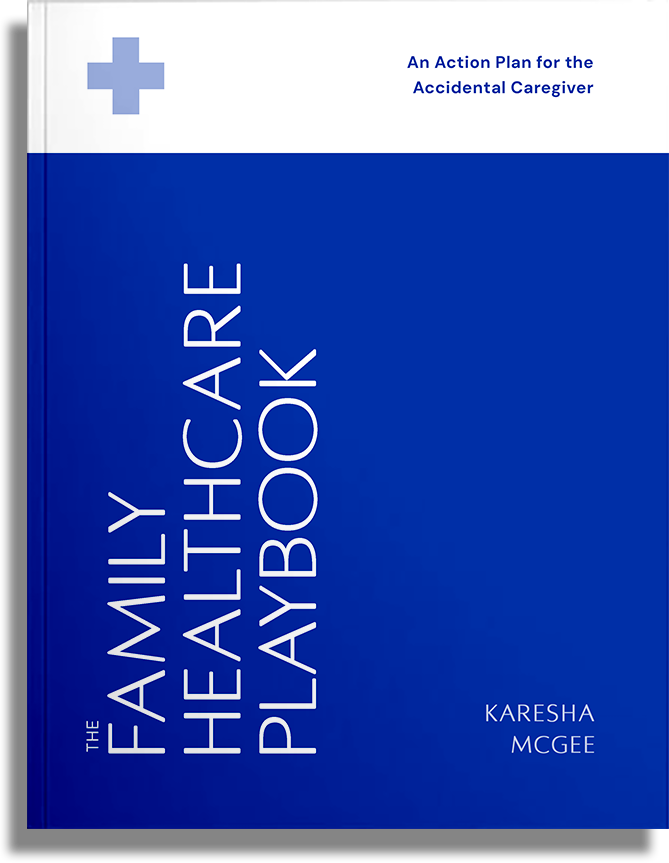
The Family Healthcare Playbook:
An Action Plan for the Accidental Caregiver
What to Do When You Don’t Know What to Do….
This playbook is a practical, step-by-step guide for other accidental or unexpected caregivers, working adults suddenly needing to take care of a loved one. It prepares the reader for their new, unexpected role as a non-professional, unpaid caregiver or helps them navigate a caregiving crisis if they are already in the thick of it.
Sign up below to be notified of the book’s release.
Available in Print and Digital formats in 2026.
Sign up below to be notified of the book’s release.
About the Author
Karesha McGee is an award-winning global communications leader and sought-after public speaker with 20+ years of experience in the high-tech industry. She is also a caregiver.
In her day job, she’s advised C-level and senior executives at large multinationals, high-growth start-ups, and venture capital firms, including Slack (now Salesforce), Cisco, Oracle, Uber, HelloTractor, and VestedWorld. Throughout her career, she’s also served as a primary caregiver for her mother, who has experienced significant health challenges, including breast cancer and two brain aneurysms resulting in multiple brain surgeries and other medical interventions.
The dichotomy of serving as a senior enterprise tech executive while simultaneously serving as a primary caregiver has required her to develop a unique set of tools – across software and medicine – to manage and maintain her livelihood while navigating the labyrinthine healthcare system. The Family Healthcare Playbook: An Action Plan for the Accidental Caregiver is the culmination of what she has learned as both a business executive and a caregiver.
To learn more, please get in touch. In addition to the book, Ms. McGee is available for one-to-one consulting and speaking engagements.

FAQs
-
The Family Healthcare Playbook: An Action Plan for the Accidental Caregiver is a practical, step-by-step guide for working adults suddenly thrust into the world of caregiving. Born out of a blind-siding medical crisis and the subsequent caregiving journey Karesha McGee experienced with her mother, this book helps the reader and their loved ones prepare for a future medical issue or manage if they're already in one. It also assists the reader in navigating their new, unexpected role as a non-professional, unpaid caregiver or helps them cope if they are already in the thick of it.
-
Combining the wisdom and comfort of a trusted friend with the urgency and directness of your favorite teacher, who always tells it like it is, this book includes:
Best practices, lessons learned, and advice to help you and your loved ones prepare for a future medical issue or manage through one if you’re already in one.
Family medical templates and worksheets for you and your loved ones to complete, along with links to other online support resources.
A discussion guide and series of conversation starters designed to help you navigate your caregiving journey and initiate potentially tricky conversations with your loved ones.
Short checklists of action items you can begin working on today! The items are organized by time, with recommendations on how to get started, whether you have 5 minutes, 30 minutes, 1 hour, or a few days to work on this.
-
While writing this book, I’ve often been asked: You come from tech, so why not an app instead of a book? What about building an AI Agent?
In the case of GenAI, AI Agents, and apps, I’ve found it most helpful to have a “YES, AND” approach to caregiving. YES, I am all for using technology to help address some of the challenges and opportunities associated with caregiving. Technology can augment some of the work of a caregiver, such as using AI tools for note-taking during a loved one’s doctor appointment, or to review trends in your loved one’s blood pressure readings over time, removing their PHI (Protected Health Information) before entering, of course. In fact, early research and reports indicate that AI may become an enormously helpful tool for medical professionals and caregivers together. AND at the same time, I started with a playbook that includes words of advice, resources, and templates that are simple and perhaps surprisingly low-tech by design. Why?
Caregiving starts and ends with the person – the patient. Despite technology interventions, all medical issues involve people and the complexities, emotions, neurosis, and stressors of being human. Yes, there are many ways to “optimize” and “enable” caregiving with technology, i.e., telemedicine, diagnostic testing, etc. Still, when your loved one is in the Intensive Care Unit (ICU) or you’re suddenly faced with a life-or-death decision, a lot of that technology goes out the window. Caregiving and all the emotions associated with it will – and should – always require a human touch.
-
Unpaid caregiving has become an epidemic in the United States.
In the United States alone, AARP and The National Alliance for Caregiving estimate that “63 million Americans—nearly 1 in 4 adults—provided ongoing care for an adult or a child with a complex medical condition or disability in the past year, an increase of 20 million from 2015 to 2025.”*
Those numbers are expected to accelerate dramatically in the coming years due to a steadily aging population, post-COVID-19 healthcare needs, and increasing demands for home healthcare services.
Unpaid caregiving is also a tremendous economic drain on our society: Care provided by these millions of unpaid caregivers totaled $600B in unpaid contributions in 2021, a $130 billion increase from 2019.**
While resources, programs, and infrastructure exist for professional caregivers, accidental caregivers are often left to fend for themselves… until now.
*Statistics from AARP Press Room, “New Report Reveals Crisis Point for America’s 63 million Family Caregivers,” July 23, 2025, https://press.aarp.org/2025-07-24-New-Report-Reveals-Crisis-Point-for-Americas-63-million-Family-Caregivers.
**Statistics from 2023 AARP Report: New AARP Report Finds Family Caregivers Provide $600 Billion in Unpaid Care Across the U.S. https://www.aarp.org/caregiving/financial-legal/unpaid-caregivers-provide-billions-in-care/.
Legal Disclaimers
Disclaimer: The author is not a medical professional. This book and the content of this website are not intended as a substitute for the medical advice of a licensed physician. Readers should consult their healthcare provider before making any decisions related to their health.
Disclaimer: The author is not a lawyer and is not admitted to practice law in any jurisdictions in the United States. Nothing in this book or on this website is intended to substitute for qualified legal advice or practice. The author strongly encourages readers to seek competent legal advice from professionals authorized to practice law within their states or territories before creating any legal documents and/or making legal decisions.

